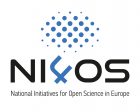
Slovenian project partners, University of Maribor Library and Arnes, organized the Slovenian NI4OS-Europe capacity building on 25th November 2020. The event was organized in collocation with the Arnes conference Mreža znanja 2020 (Network of Knowledge 2020), an annual conference dedicated to informatics and computer science in the fields of education, research and culture which covers systemic aspects of the use of new technologies as well as presentations of good practices.
The capacity building session was called Open Data & Resources and focused on the European Open Science Cloud, the FAIR principles, research data management and supercomputing.
The event was opened by an introduction about the European Open Science Cloud and its latest developments as well as future plans, by Peter Sterle, Slovenian EOSC Governance Board representative from the Ministry of Education, Science and Sport.
Dr Andreja Gomboc from the University of Nova Gorica presented the developments in gathering, analyzing and simulating large astronomical data sets and emphasized HPC computing needs in the process in her presentation Astronomical Data in the Era of Large Sky Surveys.
Following, was an overall presentation of activities in the field of supercomputing in Slovenia, where Damjan Harisch from Arnes presented the Slovenian national supercomputing network – SLING, and the recently established HPC competence center EuroCC@SLING, that will offer training and advance digital literacy in the field of HPC computing. Dejan Valh from the Institute of Information Science in Maribor (IZUM) presented the Vega supercomputer, which is expected to be operational by the end of March 2021 at the Institute of Information Sciences. With a capacity of 6.8 petaflops per second, the system will be ranked amongst the world’s top 50 supercomputers.
Dr Matej Praprotnik, from the National Institute of Chemistry and member of the PRACE Board of Directors and Chair of the PRACE Scientific Steering Committee, presented the review and assessment process for the HPC resource allocation in the SLING network.
After a short break, the focus of the event was on the FAIR principles, data and infrastructure. Dr Milan Ojsteršek from the University of Maribor and EOSC FAIR WG representative described the national open access infrastructure and the FAIRification processes that support the life cycle of research datasets and interoperability between the national open access infrastructure and the national COVID-19 data portal, found on https://covid19dataportal.si/.
Following, Dr Aljoša Hafner from CERIC-ERIC who is involved in the PanOSC project, explained how the PanOSC project is developing a FAIR workflow from the beginning of the design of an experiment to the long-term storage of published data, making photon and neutron sources fully compatible with the FAIR principles.
Dr Ana Slavec from the InnoRenew CoE and EOSC FAIR WG representative presented the FAIR principles in detail, explained their implementation in practice and different areas, and focused on the importance and challenges of research data management.
The final presentation by Dr Marinka Žitnik from the University of Harvard explained the importance of interdisciplinarity and interoperability in finding a cure for COVID-19 with artificial intelligence.
214 people registered for the event, including funders, service providers, IT specialists, teachers, librarians, and researchers from all science and education spheres. The event was live-streamed online with up to 350 simultaneous viewers.
The presentations and recordings are openly available on the NI4OS-Europe Training Platform.
Links:
